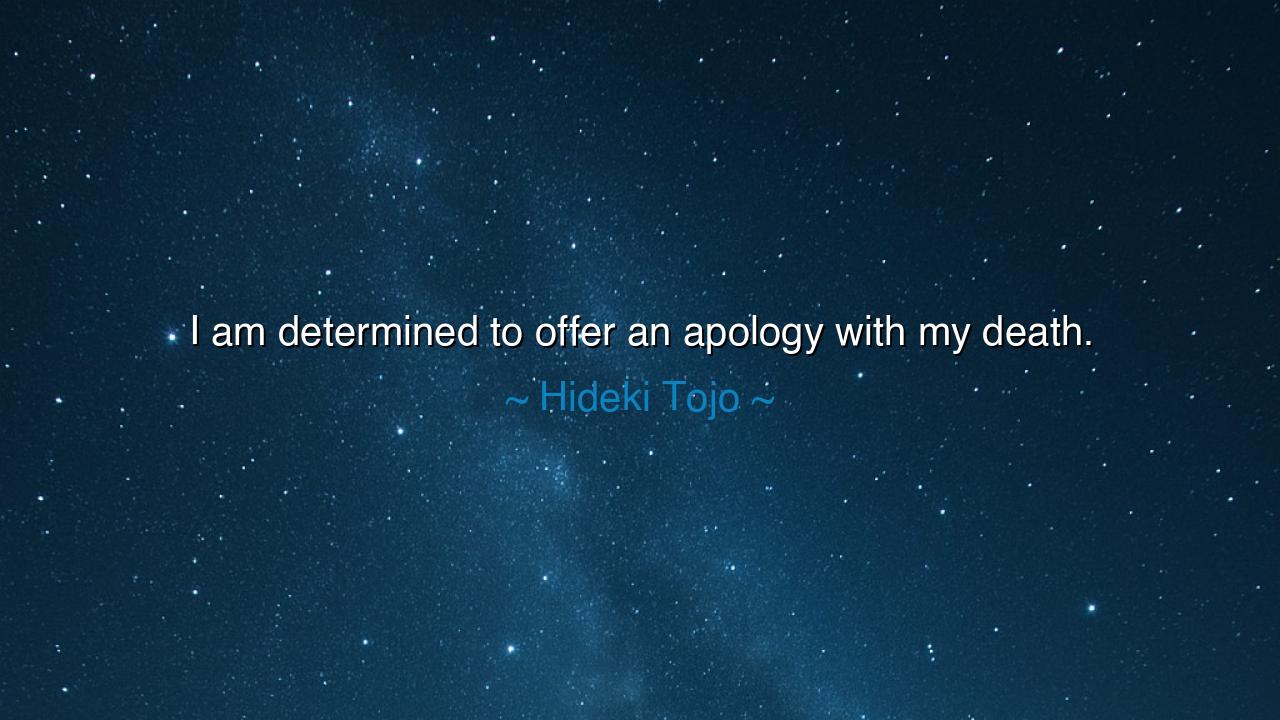
I am determined to offer an apology with my death.






Host:
The soft murmur of the café was barely audible over the quiet rhythm of the rain against the windows. Inside, the warmth of the lamps softened the edges of the world outside, wrapping the room in a feeling of stillness and quiet. Jack sat at the corner table, his fingers lightly tapping the side of his coffee cup, lost in thought. Across from him, Jeeny rested her elbows on the table, her fingers loosely clasped as she watched him, sensing that something was on his mind.
The atmosphere felt heavy, yet peaceful, as if their conversation was about to take a deeper turn.
Finally, Jack spoke, his voice soft but heavy with meaning.
Jack:
"I came across this quote from Hideki Tojo today. He said, ‘I am determined to offer an apology with my death.’” He paused, his eyes distant, as though the weight of the words had settled in. "It struck me — the idea of offering an apology at the very end of life. How do we even approach something like that? Can we really make amends, or is it too late by the time we realize we need to?"
Jeeny:
Her eyes softened with understanding, a quiet compassion in her gaze as she absorbed his words. "It’s a powerful thought, Jack. To be at the end of your life and realize the things you wish you’d done differently, the apologies you should have offered, the wrongs you should have righted. Maybe the tragedy is that, in some cases, people don’t get the chance to make amends. But perhaps that’s what Tojo is acknowledging — that sometimes, the only thing left to give is the acknowledgment of one’s wrongs, even if it comes too late." She paused, her voice gentle but serious. "There’s something very raw and vulnerable about realizing that your apology is all you can offer at the end, because you didn’t have the courage to say it sooner."
Jack:
He nodded, his expression reflecting a deep, almost haunted understanding. "Yeah, it’s as if all the weight of a life filled with mistakes and regrets can only be lifted through that final gesture. But does it really make a difference at the end? Does an apology, given too late, still carry any meaning? Or is it just a moment of closure for the person offering it, rather than the people it’s intended for?" He leaned back slightly, his fingers still tapping on his cup. "Is there a point when it’s too late to make amends? Or can the act of trying to make things right at the end still hold value?"
Host:
The dim lighting around them seemed to reflect the deepening of the conversation, the weight of their words settling like a quiet shadow over the table. The world outside, with its chaotic rhythm, seemed distant, leaving only the soft rhythm of the rain and the shared understanding of the difficult questions between Jack and Jeeny.
Jeeny:
Her gaze never wavered from his, her voice thoughtful yet firm. "I think there’s always value in an apology, Jack, no matter when it comes. Even if it’s at the end of a life, it’s still an acknowledgment of what was wrong. It’s still an admission of our human flaws, our regrets. In some ways, it might not be the apology that matters as much as the act of realizing what’s been lost, what hasn’t been healed. Maybe an apology at the end is the only thing that brings a sense of peace — not to undo the past, but to acknowledge it."
Jack:
He exhaled slowly, the complexity of her words settling in as he absorbed the deeper meaning. "So, it’s not about fixing everything. It’s about recognizing the wrongs, even if you can’t make up for them. Even if it’s too late." His expression softened, as though he was letting the weight of the conversation settle inside him. "I think I understand now. The apology isn’t the final fix, but it’s a way of offering peace, of showing that we see the hurt we’ve caused, even when it’s too late to do anything about it."
Jeeny:
Her smile deepened, the quiet strength in her words evident. "Exactly. It’s about owning our actions and offering that recognition, even when it doesn’t change anything. It’s a final act of humility, a way to leave the world with a sense of closure, knowing we’ve at least tried to right the wrongs, even if we can’t undo them." She paused, her voice growing softer, almost wistful. "And sometimes, that’s the most we can do."
Host:
The rain outside had become a soft, steady rhythm, its presence now a peaceful backdrop to the quiet weight of their words. Inside the café, Jack and Jeeny sat in a shared realization: that even at the end, when words feel too late, the act of offering an apology can still hold meaning. It’s not always about changing the past, but about acknowledging it, owning it, and finding peace in that acknowledgment.
As the evening deepened, they both understood that an apology, even at the final moment, is a way of offering closure to the self and to others, a final gesture of recognition that, even when it comes too late, can still offer some peace.






AAdministratorAdministrator
Welcome, honored guests. Please leave a comment, we will respond soon